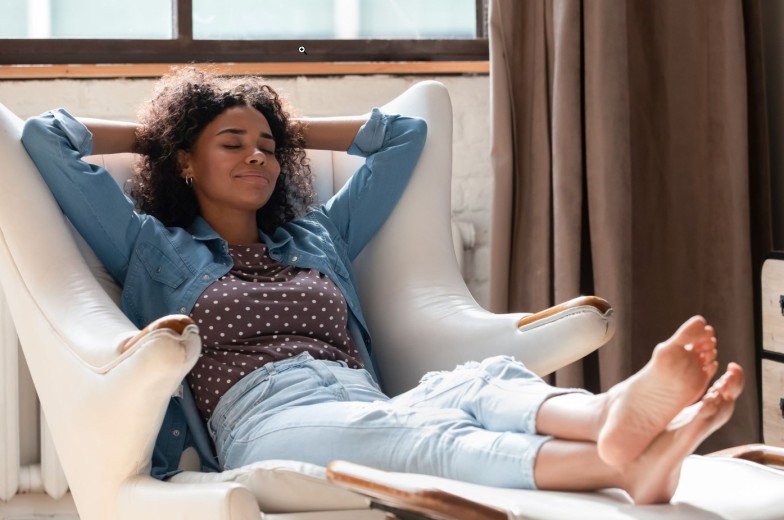
Flow Days: Everyone's Menstrual Cycle is Unique
When it comes to menstrual cycles, one thing is for sure - everyone's experience is different.
From the length and timing of cycles to the amount and duration of flow, no two people experience their menstrual cycle in the same way. This can make it difficult to know what is "normal" and can lead to confusion and frustration.
The average menstrual cycle lasts about 28 days, but cycles can range anywhere from 21 to 35 days. During this time, the body goes through a series of hormonal changes that can cause a variety of symptoms, such as cramps, bloating, mood swings, and fatigue. These symptoms can vary in intensity and duration, depending on the individual.
The amount and duration of menstrual flow can also vary widely from person to person. Some people may have a light flow that only lasts a few days, while others may have a heavy flow that lasts a week or more. Additionally, factors such as age, weight, and overall health can also impact menstrual flow.
One common misconception is that periods always come once a month. While a menstrual cycle is typically measured in monthly increments, it's important to remember that not everyone experiences a cycle every month. Some people may have irregular cycles, skipping periods or experiencing longer or shorter cycles.
Another important consideration is that menstrual cycles can change over time. Factors such as pregnancy, breastfeeding, and menopause can all impact the regularity and duration of periods.
Tips for women with long periods

For women with long periods, it can be challenging to manage the heavy flow and the associated symptoms.
Here are some tips that may help:
- Use a menstrual cup: Menstrual cups are a great option for women with long periods because they can hold more blood than tampons or pads. They are also more comfortable and don't cause irritation or odor. Just make sure to empty it out every few hours and wash it thoroughly before reusing.
- Stay hydrated: Drinking plenty of water can help to reduce bloating and cramping, which are common symptoms of long periods. It can also help to flush out toxins and regulate your menstrual cycle.
- Eat a balanced diet: Eating a healthy and balanced diet can help to reduce the severity of PMS symptoms and keep your energy levels up during your period. Make sure to include plenty of fresh fruits and vegetables, whole grains, lean protein, and healthy fats in your diet.
- Exercise regularly: Exercise can help to boost your mood, reduce stress, and alleviate cramps and bloating. Try to do at least 30 minutes of moderate exercise per day, such as walking, jogging, or yoga.
- Use heat therapy: Applying heat to your lower abdomen can help to alleviate cramps and discomfort during your period. Use a heating pad, hot water bottle, or take a warm bath to soothe your muscles.
- Talk to your doctor: If your period lasts longer than seven days, or if you experience severe pain or heavy bleeding, it's important to talk to your doctor. They may recommend hormonal birth control or other treatments to help regulate your menstrual cycle and reduce your symptoms.
In conclusion, long periods can be a challenge, but there are many ways to manage the symptoms and make it more bearable. By taking care of yourself and seeking medical advice when needed, you can stay healthy and happy during your menstrual cycle.

Tips for women with painful periods
Painful periods, also known as dysmenorrhea, can be a frustrating and uncomfortable experience for many women. The pain and discomfort can range from mild cramps to severe abdominal pain, headaches, and even nausea. If you're someone who experiences painful periods, it's important to seek help and make some lifestyle changes to help ease the discomfort. Here are some tips for women with painful periods:
- Exercise: Exercise can help reduce cramps and increase blood flow, which can help ease the pain. Even a simple walk or light stretching can be helpful.
- Apply heat: Applying heat to the lower abdomen or back can help reduce the severity of menstrual cramps. A heating pad, hot water bottle, or warm bath can be beneficial.
- Relaxation techniques: Stress can exacerbate menstrual pain, so practicing relaxation techniques such as deep breathing, yoga, or meditation can help reduce the discomfort.
- Over-the-counter pain relievers: Over-the-counter pain relievers such as ibuprofen or naproxen can help reduce menstrual cramps and pain.
- Healthy diet: Eating a healthy, balanced diet can help reduce inflammation and improve overall health, which can in turn reduce menstrual pain.
- Stay hydrated: Drinking plenty of water can help reduce bloating and cramps, and may help with headaches.
- Birth control: Hormonal birth control methods such as the pill, patch, or IUD can help regulate the menstrual cycle and reduce the severity of menstrual pain.
It's important to note that if you're experiencing severe menstrual pain or if your periods are interfering with your daily life, it's important to talk to your healthcare provider. They can help determine the underlying cause of your pain and recommend appropriate treatment options.

Tips for women with irregular periods
Irregular periods can be frustrating and challenging to manage for many women. While some women experience a regular menstrual cycle every month, others may have a cycle that is longer or shorter, or they may skip periods altogether. Irregular periods can be caused by a variety of factors, including stress, weight changes, hormonal imbalances, and certain medical conditions. Here are some tips for women with irregular periods:
- Keep track of your cycle: Start tracking your periods on a calendar or a period tracking app. This will help you identify any patterns or irregularities in your cycle, which can help you better manage your periods.
- Manage stress: Stress can disrupt your menstrual cycle and make your periods irregular. Find ways to manage your stress levels, such as practicing yoga, meditation, or deep breathing exercises.
- Maintain a healthy weight: Being underweight or overweight can affect your menstrual cycle. Make sure you are maintaining a healthy weight through a balanced diet and regular exercise.
- Talk to your doctor: If you have irregular periods, it's important to talk to your doctor. They can help determine the cause of your irregular periods and recommend appropriate treatment options.
- Consider birth control: Birth control pills can help regulate your menstrual cycle and make your periods more regular. Talk to your doctor about which type of birth control is best for you.
- Address underlying medical conditions: Certain medical conditions, such as polycystic ovary syndrome (PCOS) or thyroid disorders, can cause irregular periods. If you suspect you have an underlying medical condition, talk to your doctor.
- Be prepared: Because your periods may be irregular, it's important to be prepared. Keep sanitary products with you at all times, just in case.
In conclusion, irregular periods can be frustrating to deal with, but there are ways to manage them. By keeping track of your cycle, managing stress, maintaining a healthy weight, talking to your doctor, considering birth control, addressing underlying medical conditions, and being prepared, you can better manage your periods and feel more in control of your body.

Tips for women with short periods
Short periods, or periods that last for fewer than three days, can be a cause of concern for some women. While it's normal for periods to vary in length, some women may experience short periods due to various reasons such as hormonal imbalances, stress, changes in weight, or underlying health conditions. If you have short periods and are concerned about your menstrual health, here are some tips that may help:
- Keep track of your menstrual cycle: Monitoring your menstrual cycle can help you determine if your periods are regular or if there are any changes. Tracking your cycle can help you identify patterns and discuss any concerns with your healthcare provider.
- Maintain a healthy diet and exercise routine: Eating a healthy and balanced diet and engaging in regular physical activity can help regulate your menstrual cycle and improve your overall health.
- Reduce stress: Stress can have an impact on your menstrual cycle. Practice stress-reducing techniques such as yoga, meditation, or deep breathing exercises to help manage stress.
- Get enough sleep: Lack of sleep can cause hormonal imbalances that can affect your menstrual cycle. Aim for 7-9 hours of sleep every night to help regulate your hormones.
- Talk to your healthcare provider: If you have concerns about your menstrual health or if you experience any other symptoms such as heavy bleeding, cramping, or irregular periods, speak to your healthcare provider. They may recommend further tests or treatments to address your concerns.
In conclusion, having short periods is not necessarily a cause for concern, but it's always a good idea to monitor your menstrual cycle and discuss any concerns with your healthcare provider. By maintaining a healthy lifestyle and seeking medical advice when needed, you can help regulate your menstrual cycle and improve your overall health.
Overall, it's important to remember that there is no "right" or "wrong" way to experience a menstrual cycle. Every person's body is unique, and it's important to pay attention to your own individual experience. By tracking your menstrual cycle and staying in tune with your body, you can better understand what is normal for you and address any concerns with your healthcare provider.






